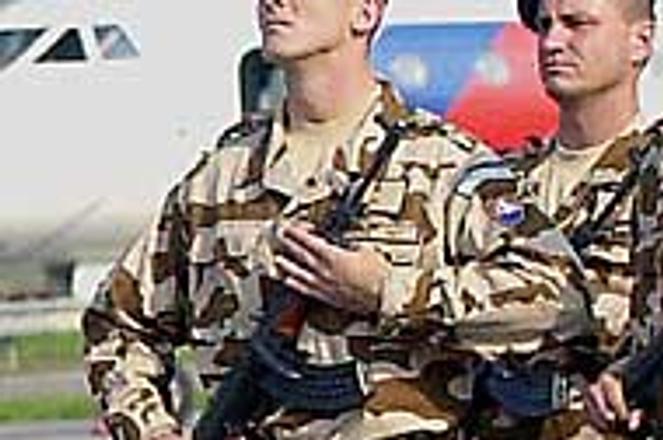AS SLOVAK soldiers left for Bagram, few state officials feared for their country's safety.photo: TASR
IN THE FALLOUT from terrorist attacks in the US last September, more migrants and less heroin arrived in Slovakia from Afghanistan. Huge security concerns, however, did not engulf the small central European nation.
"We are not ruling out the possibility of a terrorist attack taking place, and the places where these could occur are specially protected," said Interior Ministry spokesman Jozef Sitár.
"But following the terrorist attacks, we concluded that the likelihood of Slovakia's being attacked is very small, because we are not an interesting country for terrorist organisations."
Indirectly, on the other hand, Slovak national security has been threatened by migration sparked by the American-led air raids and follow-up operations against Afghanistan, which started in October 2001.
"Our domestic security has been significantly influenced by the terrorist attacks against the United States, particularly in the growth of a migration wave from the central Asia region," reads the Interior Ministry's security report for 2001.
Eva Černá, spokesperson for the local branch of the United Nations High Commissioner for Refugees (UNHCR), confirmed that Afghan refugees now made up almost half of all asylum applications in Slovakia, and had been on the rise since soon after 9/11.
While Afghans have always been the largest group of refugees in this country, making up around 40 per cent of all incoming migrants, their numbers went up significantly last year. In 1999 there were 654 Afghan asylum applicants, but in 2001 the number had climbed to 4,315, of which 2,237 arrived after September 11.
"The air strikes following September 11 brought more asylum seekers from Afghanistan to various countries, including Slovakia," said Černá.
Miroslav Samek, director of the border and aliens police section, agreed the air strikes had had a major impact on refugees coming to Slovakia.
"In 2001 we detained around 4,800 Afghans. Many had started on their journeys even before the air strikes, in the expectation of attacks."
Apart from the hardships to the refugees themselves, officials said the migration wave had only put more money in the hands of criminal gangs ferrying fugitives westwards.
"Many leave the [Slovak] refugee camps during the asylum process and migrate further West," said Černá.
The unstable situation in Afghanistan, long a major heroin producer with a strong share of the Slovak drug market, also had a major impact on the Slovak underworld.
"In the first months following September 11, when the [Afghan] borders started to be guarded to prevent terrorists from escaping, there was less heroin coming across, it was diluted, the quality was lower and prices went up," said Igor Koščál, director of the National Anti-Drug Unit at police headquarters.
The changed situation did not last long, Koščál said: "After two to three months things went back to normal. The price and quality of heroin are now about the same as before."
However, Slovak police have said that Afghanistan appears to have been overtaken by competing suppliers of the western drug market.
"Afghanistan's role is not as dominant as before, and production is going up in neighbouring countries and Albania, where there are more favourable conditions for producing drugs," Koščál said.
As Slovakia prepared to mark the anniversary of last year's terrorist attacks, sociologist Zuzana Kusá from the Slovak Academy of Sciences said no analysis yet existed of the overall impact of the attacks on Slovak society.
The Interior Ministry, however, maintains that its quick actions helped to keep that impact at a minimum.
"The success of the measures taken has been reflected in the fact that no terrorist acts, signs of panic or hysteria occurred," reads the ministry's security report.


